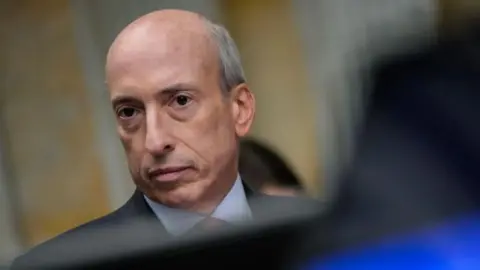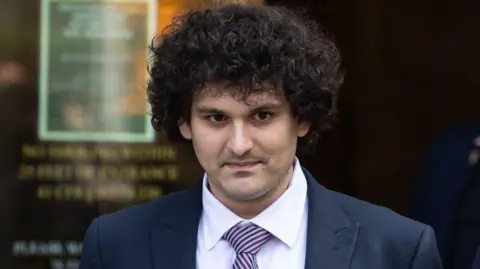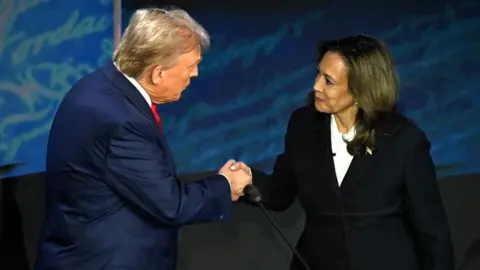 Getty Images
Getty ImagesThe cryptocurrency industry is “rife with fraud, charlatans and scammers,” one of the United States’ top financial regulators has told the BBC.
U.S. Securities and Exchange Commission (SEC) Chairman Gary Gensler says “investors around the world have lost too much money” because of cryptocurrency companies that don’t follow the laws his agency is trying to enforce.
The move comes as the industry spends millions of dollars in political donations, trying to influence the outcome of the November U.S. election in hopes of securing more favorable future laws.
In addition to the presidential battle between Donald Trump and Kamala Harris, all 435 House districts are up for re-election, as are 33 of the 100 Senate seats.
The future of cryptocurrency, one of the most debated technologies in the world, is a topic on which there appears to be a clear dividing line between Donald Trump and the outgoing Biden administration.
Trump courted the votes of cryptocurrency enthusiasts by promising to make America “the cryptocurrency capital of the world” and creating a “strategic national stockpile of bitcoin” similar to the U.S. government’s gold reserves.
This week he launched a new cryptocurrency company called World Liberty Financial, and while he provided few details, he said, “I think crypto is one of those things that we have to do.”
It’s a huge turnaround from three years ago, when he dismissed Bitcoin as something that “It looks like a scam” and a threat to the US dollar.
Trump’s newfound enthusiasm stands in stark contrast to the Biden administration, of which Harris is vice president. The White House has led a sweeping crackdown on cryptocurrency companies in recent years.
In March, Sam Bankman-Fried, the founder and CEO of FTX, was imprisoned for 25 years for fraud, after stealing billions of dollars from customers around the world, many of whom are still trying to get their money back.
Then, in April, the founder of the world’s largest cryptocurrency exchange, Binance’s Changpeng Zhao, got four months in prison, and the company paid a $4.3bn (£3.2bn) fine. It admitted enabling criminals, paedophiles and terrorists to launder money on its platform, in a case brought by the US Department of Justice.
The SEC also filed a lawsuit against Binance, one of 46 enforcement actions the financial regulator has taken in the past year against companies trying to profit from what is still an emerging technology.
 Getty Images
Getty Images“This is an area that has evolved, and just because they are recording their crypto assets in a new accounting ledger, they are saying (wrongly) ‘we don’t think we want to comply with time-tested laws,’” Gensler says.
He explains that the rules that require companies seeking to raise money from the public to “share certain information” with it have been in place to protect investors since the SEC was created.
It was 1934, the day after the infamous Wall Street Crash of 1929 that heralded the Great Depression.
“Cryptocurrencies represent only a small part of U.S. and global financial markets, but they have the potential to undermine the confidence that ordinary investors have in financial markets,” Gensler said.
While fans claim that cryptocurrency offers a fast, cheap and secure way to transfer funds, a survey by the US central bank, the Federal Reserve, found that the number of Americans using it has declined. from 12% in 2021 to 7% last year.
Harris hasn’t said much about cryptocurrencies, but one of her advisers said last month that she would “support policies that ensure that emerging technologies, and these types of industries, can continue to grow.”
Recent meetings between his team and industry executives have attempted to build trust and given crypto bosses hope for a brighter future, regardless of who wins in November.
“I can’t stress enough how important this is, not just for the United States, but for the world,” said Paul Grewal, chief legal officer of cryptocurrency company Coinbase. He attended those meetings.
“Not only is the United States a major market for cryptocurrencies, but a lot of the important technology around them was developed here. And I think it’s also critical that we don’t lose sight of the fact that the rest of the world isn’t just waiting for the United States to get to work.”
He adds that given the intensity of the White House race, “every vote counts, and crypto votes are no exception.”
 Getty Images
Getty ImagesThe crackdown on cryptocurrencies in the United States this year has been mirrored in Europe. In April, the European Union agreed on new laws to try to reduce the risk of cryptocurrencies being used by criminals.
Other regulators, however, have been slow to act. The G20, which brings together the world’s leading economies, is working on minimum standards for cryptocurrencies, but these are not legally binding and adoption has been slow.
Back in the United States, a bill to regulate cryptocurrencies has been passed The House of Representatives approved the measure, but the Senate did not. Critics say it would provide fewer consumer protections.
Coinbase’s Grewal supports the bill, saying, “This is not an industry that is running away from regulation.” He adds that the industry simply wants the same standards applied to cryptocurrencies as are applied to other assets, “not higher, not lower.”
With the November US elections looming, the crypto industry has sensed an opportunity to help elect lawmakers who have a pro-business outlook.
Last month, the sector had already spent an unprecedented amount $119 million in donations, according to a study conducted by the nonprofit organization Public Citizen.
Rick Claypool, the consumer advocacy organization’s research director, says the money is being used “to help elect pro-crypto candidates and attack crypto critics, regardless of political affiliation.”
They have spent more than any other industry on corporate donations as they “try to discipline the U.S. Congress to cave to their demands for reduced oversight and weakened consumer protections,” he adds.


